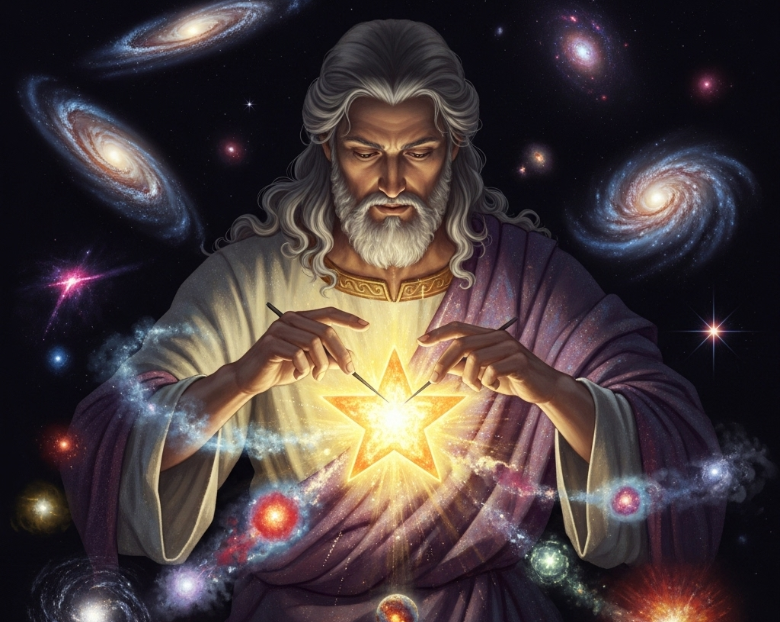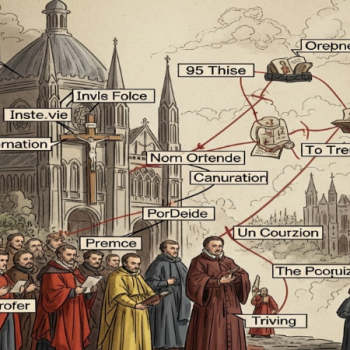
Owing to the object of theology (viz, God), those of us who seek to write on matters related to the Divine must make much use of analogies and metaphors. Therefore, when trying to understand God, a helpful approach is to consider three of God’s fundamental actions as a kind of “occupation.”
In this paper, I will use the analogy of occupations to describe three fundamental actions of God as one who creates, sustains, and is the desired end of all things.
Creator Of The Universe
When one thinks of God, it is frequently within this context. It is God, as creator, that is usually associated with the concept of God, and indeed, the Bible begins with creation.
Genesis, the first book of the Bible, is a Greek word meaning “origin” or “generation,” and this sense of God as the cause of all that is predominates in the biblical tradition. The belief in a God that is the source of creation may seem evident to Catholics and fundamental to our understanding of the universe. However, the belief that the universe needed a creator, or that there can only be one cause of creation, was not (and, for some, is not) accepted.
The ancient Greek tradition taught that the primordial universe (chaos) spawned Gaia (Earth), Tartarus (Underworld), Eros (Desire), Erebus (Darkness), and Nyx (Night). These various forces or gods then created the rest of the primordial beings, such as Hemera (Day), Uranus (Sky or Heavens), and Pontus (Sea).
An eternal universe that gave rise to the various characteristics of the current universe may seem fantastical or even silly. However, this is the default position for the rare atheist who actually contemplates cosmology and was widely held in the scientific community when a static state universe was the accepted theory. Albert Einstein would consider his original support for a static state universe to be his biggest mistake.
For its part, Catholic cosmology is predicated on the concept of creatio ex nihilo or creation out of nothing. To some extent, this concept can be misleading, for nothing comes from nothing (ex nihilo nihil fit). Rather, God is existence itself, and everything finds its ultimate origin in God.
It is true that human beings (and some of the “lower” animals) possess a capacity to create. However, it is the human ability to reason and create that reflects the image of God. Nevertheless, both our rationality and creative powers are dwarfed by God. Indeed, God’s power to create exists as an act of the Divine will. This fact leads to the second key component of God as creator: the Logos.
The term Logos can have different connotations; however, within a theological context, Logos (frequently translated from the Greek as “word”) is the creative reason and power that permeates the universe. It is also a reference to Christ, as is evident in the prologue to John’s Gospel, “In the beginning was the Word, and the Word was with God, and the Word was God. He was in the beginning with God. All things came to be through him, and without him nothing came to be.”
Nevertheless, “what came to be” must also be cared for.
That Which Sustains
It is true that one rarely considers God as that principle which sustains existence; however, the Bible considers God, among other things, as the one “who sustains all things by his mighty word [logos]” (Hebrews 1:3). This aspect of God may be considered in several ways.
Thermodynamics considers our universe an isolated system. An isolated system is one that neither shares nor obtains mass or energy from another system. It is also a universe that is subject to the laws of physics, and these laws, like most of science, are fundamentally descriptive. Put simply, science describes and utilizes existing laws that govern the universe. From a biblical perspective, these various laws that govern and sustain our universe are derived from the mind of God. (Colossians 1:17).
At a more personal level, God sustains life as its principle and efficient cause. For the most part, these terms, principal and efficient cause, are synonymous. However, for this paper, I want to stipulate a difference.
Philosophically, to speak of God as the efficient cause (an Aristotelian term) is to contend that God is the ultimate or first cause of existence. Without a first cause, there could be no subsequent causes and, therefore, nothing would exist. To consider God under the aspect of the principle cause, however, is to take a very biblical approach, which can be viewed under two separate aspects.
The will of God that created the universe continues to will the universe’s existence. Because Catholicism asserts that God is both personal and immanent, it is believed that God has not left the universe to its own devices but rather, He continues to uphold it. (Catechism of the Catholic Church, Paragraph 301).
In the second sense, God provides sustenance to His creation. This conclusion is supported biblically, particularly in the Psalms. “God is present as my helper; the Lord sustains my life.” Simply put, God acts in and through things to maintain their existence.
Thomas Aquinas’s analogy is helpful in understanding this concept of God as preserving His creation in its existence. Aquinas likens God to a musician who starts (creates) the music and then sustains the music throughout its entirety by continuing to play.
Of course, even the music must end.
The Good All Seek
All things tend toward their good. That is to say that they seek their own perfection. Accepting the existence of God, this highest good or perfection is God, for God is the source of goodness and the icon of perfection.
The concept can be understood by once more drawing from Aristotle’s four causes. Specifically, the final cause, which is defined as the purpose or reason a thing exists. The final cause of a seed is to become a plant, and the final cause for human beings is, from a biblical perspective, communion with God.
Indeed, Heaven is nothing other than a “perfect life with the Most Holy Trinity, this communion of life and love with the Trinity, with the Virgin Mary, the angels, and all the blessed is called ‘Heaven’. Heaven is the ultimate end and fulfilment of the deepest human longings, the state of supreme, definitive happiness.” (Catechism of the Catholic Church, Paragraph 1024).
This third “occupation” of God cannot be divorced from the other two. God has created human beings, sustains them in their existence, and, if they are willing, guides them to their highest and best good, which is communion with Himself.
Conclusion
The idea that God has jobs may seem incompatible with the Bible and Catholic theology. Part of the reason is owing to the non-contingent nature of God as well as the necessity to use analogies when describing God.
Nevertheless, in this essay, I have sought to suggest that the three “occupations” of God are creator, sustainer, and destination.












